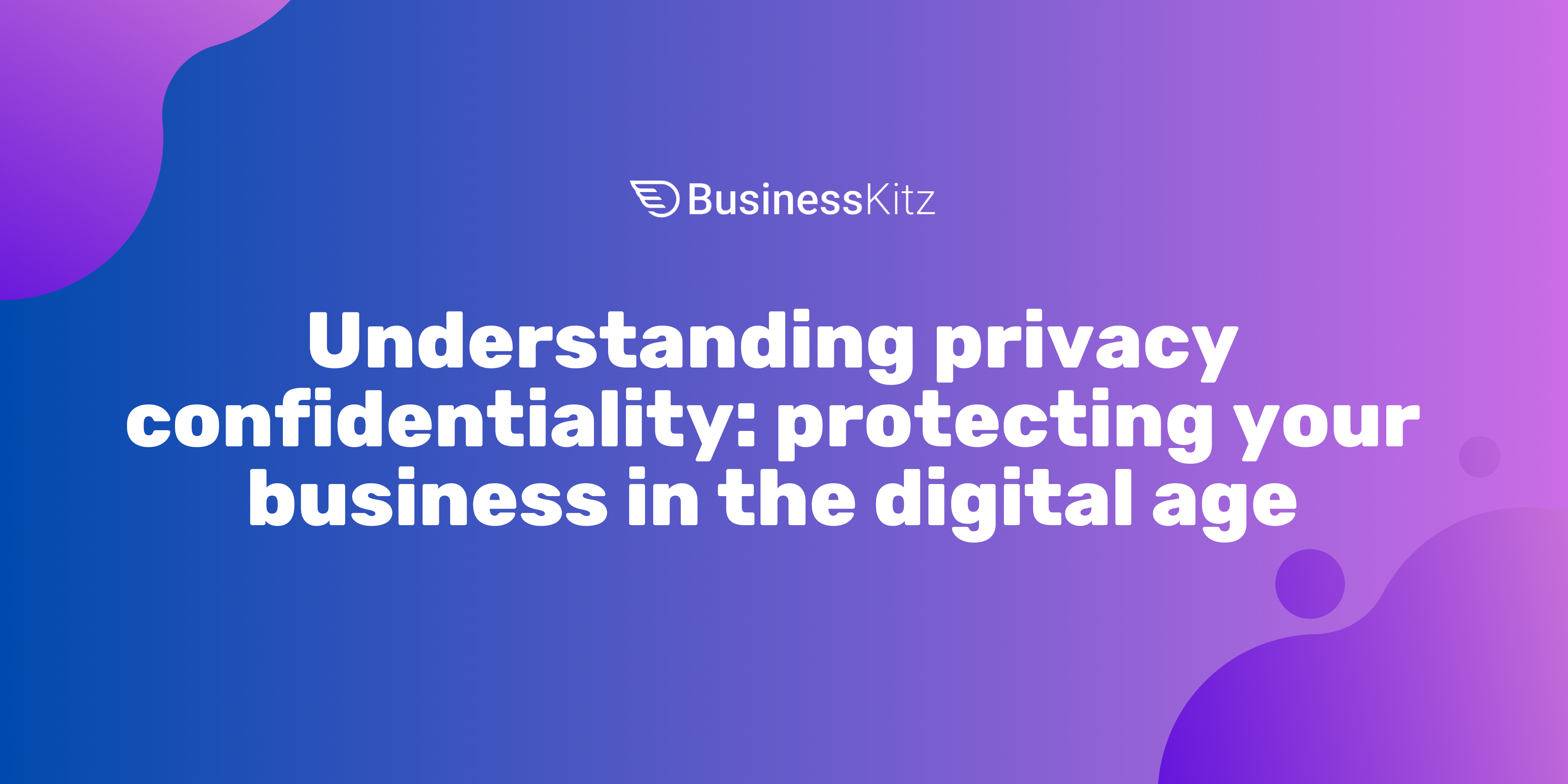
We've helped businesses save $55m with our all-in-one platform. Get instant access to this template and 115+ others, plus AI-powered document creation, starting completely free.
In today’s digital world, protecting sensitive information is more important than ever. Businesses must ensure they manage data securely to avoid breaches. Privacy confidentiality involves safeguarding personal and sensitive information to prevent unauthorised access. Understanding how to protect this data is crucial for maintaining trust and complying with privacy laws. This blog will guide you through the key aspects of privacy and confidentiality in business.
[ez-toc]
In today’s digital world, privacy and confidentiality have become more important than ever. As businesses move their operations online, the need to protect sensitive information has grown. With the rise of digital tools, managing documents securely is now a crucial part of business operations.
Privacy confidentiality refers to protecting sensitive information from unauthorised access or disclosure. It involves managing personal and confidential data carefully to prevent breaches. In today's digital world, businesses need secure systems for handling information. Implementing strong privacy and confidentiality practices ensures compliance with laws and builds trust with clients and customers.
The shift to digital platforms means that more data is being stored and shared electronically. This exposes businesses to a greater risk of data breaches. Personal, financial, and client information is often stored in digital form, making it vulnerable to cyber-attacks or unauthorised access. A breach of confidentiality can lead to severe consequences, such as reputational damage, loss of clients, or legal actions. Privacy laws, including the Privacy Act and the Australian Privacy Principles (APPs), impose strict rules on how businesses must handle personal information.Organisations must also consider the increasing demand from consumers for stronger data protection. People are more aware of their privacy rights and expect businesses to take their privacy seriously. Any lapse in maintaining confidentiality could damage the trust customers have in a business.
Business Kitz helps businesses meet the growing challenges of managing privacy and confidentiality. Through its digital signing and secure document storage solutions, Business Kitz ensures that sensitive data is protected. The platform offers encryption, access to document and legal templates such as non-disclosure agreements. By using Business Kitz, businesses can safeguard their documents and reduce the risk of breach of confidence.With Business Kitz, companies can focus on their core operations while trusting that their document management practices are secure and compliant. It provides peace of mind knowing that documents are protected, ensuring that privacy and confidentiality obligations are met.

Confidentiality is about protecting sensitive information from being shared with people or organisations that shouldn’t have access to it. Businesses need to keep certain types of information private, whether it’s about clients, employees, or proprietary business processes. Violating confidentiality can result in legal issues, reputational damage, and financial loss.
Confidentiality refers to the obligation of keeping certain information private. Businesses are required to prevent the disclosure of confidential data unless authorised. This could include financial records, trade secrets, or customer personal details. A confidentiality clause in a contract usually outlines the rules for managing and sharing sensitive data. Breaches of these rules can have serious consequences for both the business and its employees.
Different industries deal with various types of confidential information. Here are some examples:
Each industry has its own set of rules and regulations that govern the handling of confidential information. Failure to adhere to these standards can result in heavy fines and loss of trust.
Business Kitz helps businesses comply with confidentiality provisions by offering secure document storage and digital signing solutions. With Business Kitz, businesses can safeguard sensitive data and reduce the risk of data breaches. The platform ensures that documents are protected from unauthorised access. It also allows businesses to track who accesses their documents, providing a detailed audit trail. This reduces the risk of data leaks and supports compliance with privacy laws and confidentiality agreements.Using Business Kitz, organisations can protect private information and avoid costly legal issues, while meeting the privacy obligations set out by industry regulations. Try it for free here.
Privacy is about controlling who has access to personal information and how that information is used. It is a fundamental right that helps protect individuals' personal and sensitive data. When businesses handle personal information, they must follow strict rules to ensure it is kept safe from unauthorised access, misuse, or disclosure.
Privacy refers to the right of individuals to keep their personal information private. This includes how businesses collect, store, use, and share personal data. Organisations are required to follow privacy laws that dictate how personal information should be handled. In Australia, the Privacy Act and the Australian Privacy Principles (APPs) set clear guidelines on how personal information must be protected and managed.
There is a key difference between personal information and health information:
While both types of information are sensitive, health information is subject to stricter protections due to its nature and potential impact on an individual’s privacy.
Health information is heavily regulated to ensure privacy and security. In Australia, specific laws govern the protection of health information, such as the Health Records Act and the Privacy Act. Healthcare providers must ensure that patient records are securely stored and only accessed by authorised personnel.Businesses in the health sector, such as hospitals and clinics, must take extra steps to protect health information. This includes ensuring that data is encrypted, maintaining strict access controls, and regularly reviewing security practices. Breaches of health information can lead to serious consequences, including loss of trust and legal penalties. By using secure platforms like Business Kitz, healthcare providers can manage and store health information safely to support your compliance.

The Privacy Act is an important piece of legislation in Australia that regulates how businesses must handle personal information. It aims to protect the privacy of individuals by setting out clear guidelines for collecting, storing, and using personal data. Businesses that deal with personal information must follow these rules to ensure they are compliant with Australian privacy laws.
The Privacy Act applies to businesses with an annual turnover of over $3 million, as well as some smaller organisations, government agencies, and health service providers. It governs the collection, storage, and use of personal information. Businesses must have a privacy policy in place that explains how they collect and manage data. The Act also gives individuals the right to access their personal data, request corrections, and ask for their data to be deleted in some circumstances.The Privacy Act imposes strict obligations on businesses to ensure they are handling personal data responsibly. Failure to comply with the Act can lead to significant penalties, including fines and reputational damage.
The Australian Privacy Principles (APPs) are part of the Privacy Act. These principles outline the rules businesses must follow to manage personal data responsibly. Key aspects include:
These principles help businesses build trust with their customers by ensuring that personal data is handled responsibly and securely.
Business Kitz helps businesses comply with the Privacy Act and the Australian Privacy Principles by offering secure digital document management solutions. Our platform ensures that documents are safely stored, with encrypted digital storage and robust access controls. These features make it easier for businesses to follow the APPs, especially regarding secure storage, data access rights, and use and disclosure of sensitive information.With Business Kitz, businesses can rest assured that they are meeting obligations while streamlining their document workflows. The platform also offers detailed audit trails, making it easier for businesses to track data usage and ensure compliance with legal and regulatory requirements. This ensures that businesses stay on top of their privacy obligations and reduce the risk of data breaches or compliance issues.

Understanding the differences between confidentiality and privacy is crucial for businesses. Both concepts are essential when managing sensitive information, but they serve different purposes and have different legal implications. Knowing when to apply each can help businesses ensure they are compliant with regulations and protect their data effectively.
It is important to know when to apply privacy or confidentiality, as each has different uses:
Safeguarding personal information is essential for any business. Compliance with privacy regulations is not just a legal requirement, it also helps build trust with customers. Here are some practical steps to help protect personal data and ensure compliance with the Privacy Act.
Businesses can take several measures to protect personal information:
To comply with the Privacy Act and safeguard personal data, businesses should:
Business Kitz offers several features that help businesses stay compliant with privacy regulations:
With Business Kitz, businesses can confidently protect personal information while ensuring they meet their privacy obligations. Try it for free here.
In healthcare, confidentiality is crucial for safeguarding patient information. Healthcare providers must carefully manage patient consent and medical records to comply with privacy laws and protect patients’ sensitive health data.
Confidentiality in healthcare refers to the duty of healthcare providers to protect patient information. This includes personal details, medical histories, treatment plans, and test results. Patients trust healthcare providers to keep this information secure, ensuring their privacy is respected.
There are several regulations in place to protect health information, including:
Business Kitz offers secure digital solutions that help healthcare providers meet confidentiality provisions and comply with privacy regulations:
By using Business Kitz, healthcare providers can confidently manage and store health information while adhering to confidentiality provisions and safeguarding their patients’ privacy.
Digital solutions offer significant advantages for businesses looking to manage privacy and confidentiality efficiently. These solutions improve workflow efficiency, enhance security, and reduce risks associated with traditional document handling.
Digital solutions help businesses streamline their operations. Here’s how:
Traditional paper-based systems are more vulnerable to risks like theft, loss, and damage. Digital document management minimises these risks in several ways:
Privacy refers to the right to control personal and sensitive information, while confidentiality focuses on keeping that information secure and limiting access. Privacy involves how information is collected, shared, and stored, whereas confidentiality ensures that this information remains secure within a specific relationship, such as with healthcare providers or legal professionals.
Information privacy is crucial for businesses that handle sensitive data. Organisations must protect personal and business information, ensuring it complies with privacy laws and regulations. Businesses need to understand their obligations under specific legislation like the Privacy Act. By safeguarding privacy, they can build trust and avoid legal issues related to data misuse.
The Privacy Act imposes obligations on businesses to protect personal and sensitive information. It applies to organisations or agencies that handle such data. The act covers how personal information is collected, used, stored, and disclosed. It also sets out the 13 Australian Privacy Principles (APPs), which outline how businesses should manage this information to comply with privacy laws.
Businesses should implement strong security measures to protect confidential information. This includes encryption, access controls, and secure document storage. It is also essential to train staff on confidentiality obligations and ensure they understand their responsibilities when handling sensitive information. If necessary, businesses can seek legal advice to ensure compliance with confidentiality laws.
When businesses work with third parties, they must ensure that these parties comply with privacy and confidentiality laws. If a third party handles personal or business information, they must agree to protect it and follow the same privacy standards. Businesses need to understand their obligations when disclosing information to third parties and ensure those obligations are met.
In Australia, privacy laws provide specific protections for children’s personal information. Businesses must ensure that any information collected from children in your care is handled with extra care. The laws governing privacy impose obligations on organisations to maintain the confidentiality and security of this sensitive data.
In today's digital world, protecting privacy and confidentiality is more important than ever. Businesses must secure sensitive information to stay compliant with privacy laws and protect their reputation. Using digital solutions like Business Kitz ensures your documents are managed securely, with streamlined workflows and reduced risks.Business Kitz helps businesses stay on top of privacy regulations. It offers secure document storage, digital signatures, and audit trails, making compliance easier and more efficient.Ready to take control of your privacy and confidentiality? Try Business Kitz today for secure, reliable document management.Legal advice and a free consultation visit Legal Kitz.
Disclaimer: This content is intended to be used for educational and informational purposes only. Business Kitz does not offer legal advice and cannot guarantee the accuracy, reliability, or suitability of its website content for a particular purpose. We encourage you to seek professional advice from a licensed professional and verify statements before relying on them. We are not responsible for any legal actions or decisions made based on the information provided on our website.
Unless expressly stated otherwise, all content, materials, text, images, videos and other media on this website and its contents are the property of their respective copyright owners.
Copyright © 2025 Business Kitz 14312161